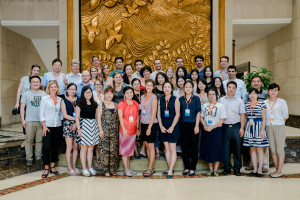2016 EU-China NGO Twinning Program Capacity and Experience Sharing Workshop held in Changsha
From August 18th to 21st, 2016, Stiftung Asienhaus, China Association for NGO Co-operation (CANGO), and 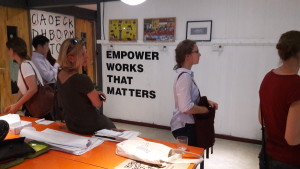 CAN Europe jointly organized a 4-day workshop on capacity building and experience sharing among European and Chinese NGOs in Changsha, Hunan province. This workshop was co-organized by P8, a social enterprise working on the testing, prototyping and up-scaling of sustainable communities P8 is located on the low carbon campus of the BROAD Group (an air condition enterprise). More than 50 participants from China, Germany, Belgium, Spain, Latvia, Portugal, Bulgaria, France, and England joined the meetings.
CAN Europe jointly organized a 4-day workshop on capacity building and experience sharing among European and Chinese NGOs in Changsha, Hunan province. This workshop was co-organized by P8, a social enterprise working on the testing, prototyping and up-scaling of sustainable communities P8 is located on the low carbon campus of the BROAD Group (an air condition enterprise). More than 50 participants from China, Germany, Belgium, Spain, Latvia, Portugal, Bulgaria, France, and England joined the meetings.
The workshop consisted of three days of intense discussions and a half day field trip with the NGO Green Hunan. The two thematic parts were: capacity building with speeches on topics related to Chinese NGO work, and experience sharing by the twinners themselves which clustered around the four topics: sustainable living, sustainable communities, inclusive education and pollution, climate change and litigation. Panel and group discussion were organized on the topic of the Sustainable Development Goals’ influence on environmental and social urbanization effects. The participants also had the opportunity to listen to a keynote speech of Dr. Rajendra K. Pachauri, the former IPCC president and Nobel prize winner.
On August 18th, Mr. Huang Haoming, Vice Chairman and Executive Director of CANGO, and Dr. Nora Sausmikat, 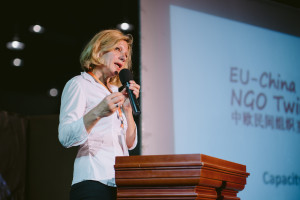 the Head of the China program and Projectmanager of the Twinning program at Stiftung Asienhaus, respectively held the opening speeches. Sausmikat reflected on 10 years of experience in civil society dialogue programs conducted by Stiftung Asienhaus. Both of them expressed their wish to continue their collaboration and strengthen NGO cooperation between the EU and China.
the Head of the China program and Projectmanager of the Twinning program at Stiftung Asienhaus, respectively held the opening speeches. Sausmikat reflected on 10 years of experience in civil society dialogue programs conducted by Stiftung Asienhaus. Both of them expressed their wish to continue their collaboration and strengthen NGO cooperation between the EU and China.
Mr. Zhang Yue, winner of the 2011 UNEP Champions of the Earth award and president of BROAD Group, greeted the Twinning pro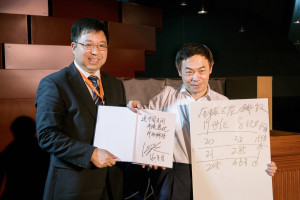 gram participants and pointed out that humanity faces an uphill struggle against climate change; highlighting the building sector’s negative impact which makes up 50% of China’s energy consumption, as well as a total rise in worldwide carbon emissions in 2015 which is 60 times higher than it was at the start of the 19th century and 15 times higher compared with the beginning of the 20th century.
gram participants and pointed out that humanity faces an uphill struggle against climate change; highlighting the building sector’s negative impact which makes up 50% of China’s energy consumption, as well as a total rise in worldwide carbon emissions in 2015 which is 60 times higher than it was at the start of the 19th century and 15 times higher compared with the beginning of the 20th century.
Mr. Huang addressed the Challenges of Civil Society Development under the New Laws from the Chinese and European perspective. The “new laws” (Charity Law, effective since 01.09.16 and China’s Law on the Management of the Activities of Overseas NGOs Within Mainland China, effective since 01.01.17) stipulate the 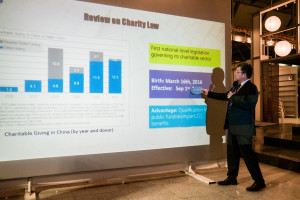 registration of non-Chinese NGOs under the Ministry for Public Security, specify the regulations on public fundraising and introduce a temporary activities registration for international NGOs which do not have offices in China. Many of these measures will, according to the government, lead to a professionalization in China’s Third Sector.
registration of non-Chinese NGOs under the Ministry for Public Security, specify the regulations on public fundraising and introduce a temporary activities registration for international NGOs which do not have offices in China. Many of these measures will, according to the government, lead to a professionalization in China’s Third Sector.
Dr. Horst Fabian, independent consultant, made in-depth comments on the information supplied by Mr. Huang’s speech; emphasizing the possible rift that might open up in Chinese-International NGO cooperation, as well as a spiral of mistrust that needs to be actively opposed by civil society organizations.
Ms. Guo Ting, Deputy Editor of China Development Brief talked about the Changes in the Public Interest 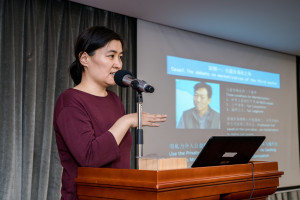 Sector due to the Marketization of the Space occupied by Civil Society Organizations. She emphasized that the main conditions for positive marketization effects, e.g. equal treatment of all stakeholders, might not be given in China and therefore this development could lead to an advantageous positioning of organizations with conservative values and the marginalization of certain topics in the NGO sector, for example gender equality.
Sector due to the Marketization of the Space occupied by Civil Society Organizations. She emphasized that the main conditions for positive marketization effects, e.g. equal treatment of all stakeholders, might not be given in China and therefore this development could lead to an advantageous positioning of organizations with conservative values and the marginalization of certain topics in the NGO sector, for example gender equality.
Mr. Li Hailong, Deputy Director of the Center for Eco-city Planning and Construction of Chinese Society for Urban Studies (CSUS), shared information on the subject of Chinese Urbanization under the Framework of the SDGs. 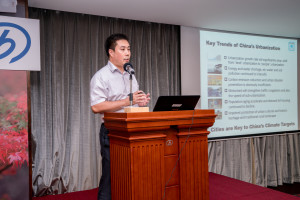 Mr. Li explained that there is little room for citizen participation in Chinese urban development planning. Only when the design is already finished and most projects are fixed will the public be informed. He pointed out that «Detailed planning needs to go to every household and talk with the people ». Currently, municipal governments are experimenting with new online methods of information sharing to secure public participation.
Mr. Li explained that there is little room for citizen participation in Chinese urban development planning. Only when the design is already finished and most projects are fixed will the public be informed. He pointed out that «Detailed planning needs to go to every household and talk with the people ». Currently, municipal governments are experimenting with new online methods of information sharing to secure public participation.
During the following group discussion, the twinners and visiting local NGO representatives identified a variety of economic, environmental and social problems triggered by rapid urbanization and possible sustainable solutions involving civil society participation. All participants were asked to reflect on their experiences concerning urbanization  effects in their respective NGO work. The first group pointed out that it is necessary to view rural and urban challenges as interrelated, to support rural development to reign in the unmanageable rural exodus, as well as the involvement of NGOs as monitoring agencies to the government. The second group also saw improvement of the living conditions in rural areas as a possible solution for the brain drain in China’s villages; they furthermore postulated a more human centered approach to urban planning for more sustainable cities.
effects in their respective NGO work. The first group pointed out that it is necessary to view rural and urban challenges as interrelated, to support rural development to reign in the unmanageable rural exodus, as well as the involvement of NGOs as monitoring agencies to the government. The second group also saw improvement of the living conditions in rural areas as a possible solution for the brain drain in China’s villages; they furthermore postulated a more human centered approach to urban planning for more sustainable cities.
The second day was divided into 4 thematic panels.
The first dealt with the concept of Sustainable Living in general and was comprised of three NGO twinner pairs. One leading question concerned the relation between growth and development. Zanda Skuja from Green Liberty Latvia, said, “If we go back to the definition that development is a social change for better, than it does not necessarily have to mean growth in the mathematical way that we commonly perceive economics. And in that case we can join the ideas of sustainable living and economic development.” Her organization promotes the sustainable lifestyle through inspiring people to buy products with fair trade labels and pilots recycle scheme to reward citizens who practice garbage sorting. The Chinese twinner Zhang Lingling, Blue Sky for Children Shanghai, pointed out that the “consumption addiction” that China faces after years or lacking needs to be addressed. NGOs should focus on the promotion of “upgraded consumption” and consumption of sustainable products, as well as pointing out the difference between short term satisfaction by consumption and long term happiness. The discussion turned to techniques of circular economies, the necessity to regain the ability to repair, and recycle, to donate idle things and finally the question value change and how to define happiness and satisfaction. Zanda pointed out that the time is ripe to change from a culture of “having” to a culture of “sharing”. Liuting Zhang, from the NGO Green Woodpecker, admonished not to forget that the rural populations still live with a “culture of lacking”, there is a big gap between cities and villages in China. In her opinion, a more urgent question should be on how to regulate a fair distribution of wealth in China. Here the audience noticed another big gap between China and Europe. Social justice in general became the focus of the discussion.
The second panel’s topic was Sustainable Communities, economically, environmental, and socially healthy and resilient communities. The discussion focused on how to create such communities by adapting integrated solutions and planning for long term goals. Each organization reported on how they worked on this topic. Wang Yuan, Friends of Nature Beijing, stressed that many of their projects are only effective if 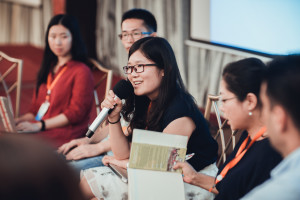 managed as community outreach programs, like the current “Low carbon household” initiative. While working on instructing one family on changing their home into a more sustainable one, might be a starting point it’s the snowball effect they strive for. Yang Deng, Collaboration Centre on Sustainable Consumption Germany, spoke of the threat of social degeneration that China faces and how her organization’s sharing communities rebuild trust and might reintroduce the human element into city planning. Louis Moreira from Quercus highlighted the role NGOs play in triggering participation and the empowerment the individual finds in communities and cooperatives. Jiaqi Liu from Friends of the old villages, pointed out the importance of community approaches in the rural areas. The general tone of this panel’s debate suggested that community level approaches to improving sustainability had a clear advantage in China and might be easier to implement in Asia than in Europe.
managed as community outreach programs, like the current “Low carbon household” initiative. While working on instructing one family on changing their home into a more sustainable one, might be a starting point it’s the snowball effect they strive for. Yang Deng, Collaboration Centre on Sustainable Consumption Germany, spoke of the threat of social degeneration that China faces and how her organization’s sharing communities rebuild trust and might reintroduce the human element into city planning. Louis Moreira from Quercus highlighted the role NGOs play in triggering participation and the empowerment the individual finds in communities and cooperatives. Jiaqi Liu from Friends of the old villages, pointed out the importance of community approaches in the rural areas. The general tone of this panel’s debate suggested that community level approaches to improving sustainability had a clear advantage in China and might be easier to implement in Asia than in Europe.
Panel 3 focused on Inclusive Education. The two NGO twinner pairs were accompanied by one 2013 alumni twinner from the Stiftung Asienhaus program. The NGO Hunan Aimier represented by Pan Yu, reported on their twinning with the British NGO Chickenshed and how their work has been continued since then, by now for almost 3 years. The twinner from the Lingnan Partner Community Support Center, Yao Zhilu, pointed out that non-formal education and awareness raising is especially important for children who basically lack everything, including a family. Referring to the first panel, she and her partner Antoaneta from BalkanKids Bulgaria pointed out, that these children do not have a “culture of having”. Orphans and prison youth are confronted with personell who usually lack pedagogigal training. One way of helping these children is the ERASMUS+ project which makes it possible to travel with disadvantaged young adults. While other panelists added their own experience in educating today’s youth, especially on environmentalism and sustainability.
The fourth and last panel was made up of four twinner pairs and dealt with the far reaching topics of Pollution, Climate Change and Litigation. The twinners first discussed the influence of and experiences made with the reformed environmental law (2015) in China. Zeng Yaping from CLAPV informed the audience that since the reform of the law 42 EPIL cases have been filed in China, 36 of these went through civil court procedures, and 34 of 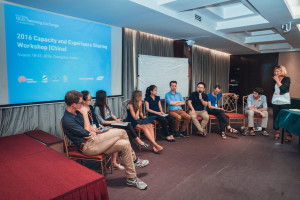 them were initiated by NGOs. There have been many examples far reaching environmental scandals. Sometimes, the NGOs had to fight though many instances right up to the Supreme Court to win the case because local courts rejected the case. This of course is only possible if the NGO has enough experienced staff and money. Peter Feldkamp from the German NGO Deutsche Umwelthilfe noted that the ability to file public interest cases is a sharp sword and an important tool for NGOs in Europe. Nevertheless he also warned, that in fields like air pollution it might lead to the state completely forsaking it’s responsibilities. This makes effective law enforcement dependent on private fundraising. The twinners, who all dealt with litigation, compared the different legal conditions under which their NGOs had to operate in the respective European country (Germany, Spain, UK, Austria) and highlighted the differences, advantages and disadvantages here and there. During the discussion, other twinners asked for the establishment of a network platform for further exchange. One question for example was on how to sue fracking companies. Other issues were carbon market mechanisms and the “Green Desert” which was created by forest monoculture projects which count as CDM projects. China’s future as Carbon Trade Market champion also led to intense discussions.
them were initiated by NGOs. There have been many examples far reaching environmental scandals. Sometimes, the NGOs had to fight though many instances right up to the Supreme Court to win the case because local courts rejected the case. This of course is only possible if the NGO has enough experienced staff and money. Peter Feldkamp from the German NGO Deutsche Umwelthilfe noted that the ability to file public interest cases is a sharp sword and an important tool for NGOs in Europe. Nevertheless he also warned, that in fields like air pollution it might lead to the state completely forsaking it’s responsibilities. This makes effective law enforcement dependent on private fundraising. The twinners, who all dealt with litigation, compared the different legal conditions under which their NGOs had to operate in the respective European country (Germany, Spain, UK, Austria) and highlighted the differences, advantages and disadvantages here and there. During the discussion, other twinners asked for the establishment of a network platform for further exchange. One question for example was on how to sue fracking companies. Other issues were carbon market mechanisms and the “Green Desert” which was created by forest monoculture projects which count as CDM projects. China’s future as Carbon Trade Market champion also led to intense discussions.
The workshops on Augus 20tht were divided between the preparation meeting for the Chinese twinners and a 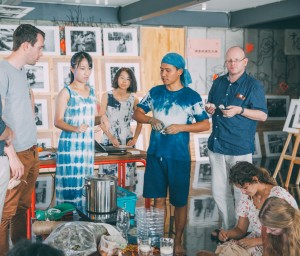 cultural event for the European participants.
cultural event for the European participants.
3 Chinese “alumni” from the Twinning programs of 2014 and 2015 shared their exchange experiences, challenges they encountered, work and livestyle advise in Europe.
While the European participant took part in a workshop that gave them firsthand experience in traditional, natural dying techniques free of polluting agents.
In the afternoon Dr. Rajendra K. Pachauri, former Chairman of IPCC, Nobel Peace Prize winner, delivered a keynote speech about the IPCC’s Fifth Assessment Report on Climate Change in China. The report highlighted the clear evidence of the human influence on the climate change. Fossil fuel consumption, overuse of natural resources, improper waste management being only a few topics of this well received speech. Dr. Pachauri also introduced a project he launched called Protect Our Planet, which emphasizes the teaching of climate change issues in schools and supports young activists. His project’s approach resonated especially in the youth focused Twinning participants and might lead to future co-operations. Dr. Pachauri’s warning that the current generation was the last that could still change the disastrous path the economic growth obsession had led humanity down on discomforted and motivated the audience at the same time. Many discussions followed this input and were carried over long into the following dinner.
His project’s approach resonated especially in the youth focused Twinning participants and might lead to future co-operations. Dr. Pachauri’s warning that the current generation was the last that could still change the disastrous path the economic growth obsession had led humanity down on discomforted and motivated the audience at the same time. Many discussions followed this input and were carried over long into the following dinner.
On 21st, August, the twinning participants went on a field trip to the drinking water source area alongside 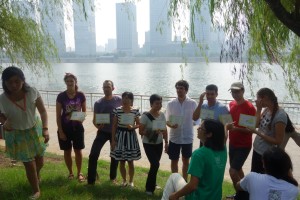 Xiang river near Juzizhou. Organized by the local chapter of Green Hunan, the twinners wandered along the shore and were introduced to the NGO’s water pollution examination measures, as well as Changsha’s new filtration and water re-usage policies. While temperatures averaging at 35°C might have left many a participant discomfited it certainly impressed the importance of access to clean drinking water on all.
Xiang river near Juzizhou. Organized by the local chapter of Green Hunan, the twinners wandered along the shore and were introduced to the NGO’s water pollution examination measures, as well as Changsha’s new filtration and water re-usage policies. While temperatures averaging at 35°C might have left many a participant discomfited it certainly impressed the importance of access to clean drinking water on all.
The workshop ended with a traditional Hunan lunch and left the Chinese and Europeans with many new impressions, deeper knowledge of various topics and possible ideas on future co-operations as well as looking forward to the final workshop of this year’s program in Berlin.
